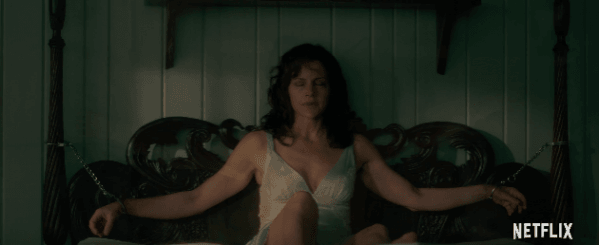Not all Stephen King adaptations will disappoint you as The Dark Tower. 'It' recently garnered an overwhelming response from the critics and audience as well. Then there is another Stephen King adaptation on its way to Netflix — Gerald's Game.
Also read: Trailer for Stephen King's Gerald's Game will remind you of Fifty Shades of Grey
In Gerald's Game movie, a woman accidentally kills her husband during a kinky game. Handcuffed to her bed with no hope of rescue, she begins hearing voices and seeing strange visions.
The movie will arrive on Netflix on September 29. Here's what critics have to say.
Variety
Taken strictly on its own terms, the film adaptation is an arrestingly and sometimes excruciatingly suspenseful psychological thriller lightly garnished with horror-movie flourishes — including one especially squirm-inducing instance of copious bloodletting — and driven by a compelling lead performance that is entirely worthy of a description too often misapplied to lesser work: tour de force.

Collider
Flanagan says he carried Gerald's Game with him to pitch meetings for years. This is a film he has wanted to make since he was a teenager. Gerald's Game is the impossible adaptation, but Flanagan has proven himself one hell of an idea man with his string of horror hits, and finding a way to make Gerald's Game work is his most impressive feat yet. This is an excellent King adaptation. It's an excellent psychological horror that investigates hard topics without flinching and without exploiting.
IndieWire
This surprisingly faithful adaptation includes one major digression, in an ongoing flashback to a traumatic incident from Jessie's youth. While the bedroom sequences are brightly lit from a number of angles that play up the claustrophobia, her childhood scenes have a remarkable expressionistic quality. Set against the red-hued backdrop of a solar eclipse, we find Jessie revisiting her abusive father (Henry Thomas) through the lens of its impact on her damaged adulthood, and Gugino makes her terrible situation entirely credible.
A.V. Club
Flanagan's adaptation streamlines the storytelling, reviving Gerald (or, at least, Jessie's hallucination of Gerald) early on to serve as the voice of every primal fear and traumatic memory that leaps to the front of Jessie's mind as the hours turn into days. This technique turns the film's lengthy second act into a combination chamber drama and survival thriller, as dehydration, a vicious stray dog, and Jessie's vision of an unearthly "Moonlight Man" interrupt her dry verbal sparring with Gerald's misogynist mirage.











![BJP fields Tashi Gyalson for Ladakh; drops sitting MP [details]](https://data1.ibtimes.co.in/en/full/797185/bjp-fields-tashi-gyalson-ladakh-drops-sitting-mp-details.jpg?w=220&h=138)



